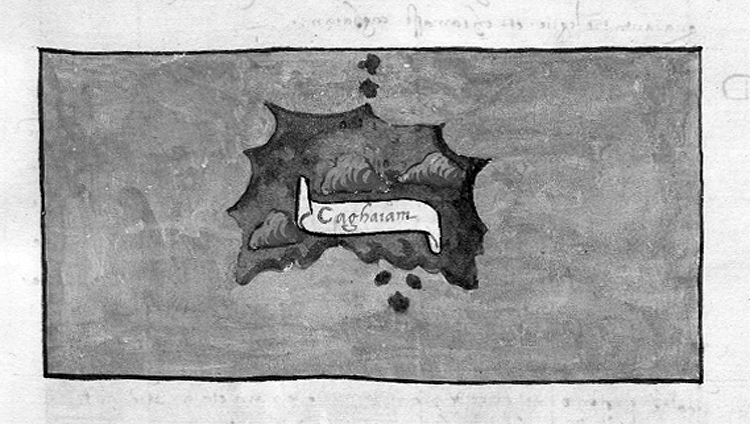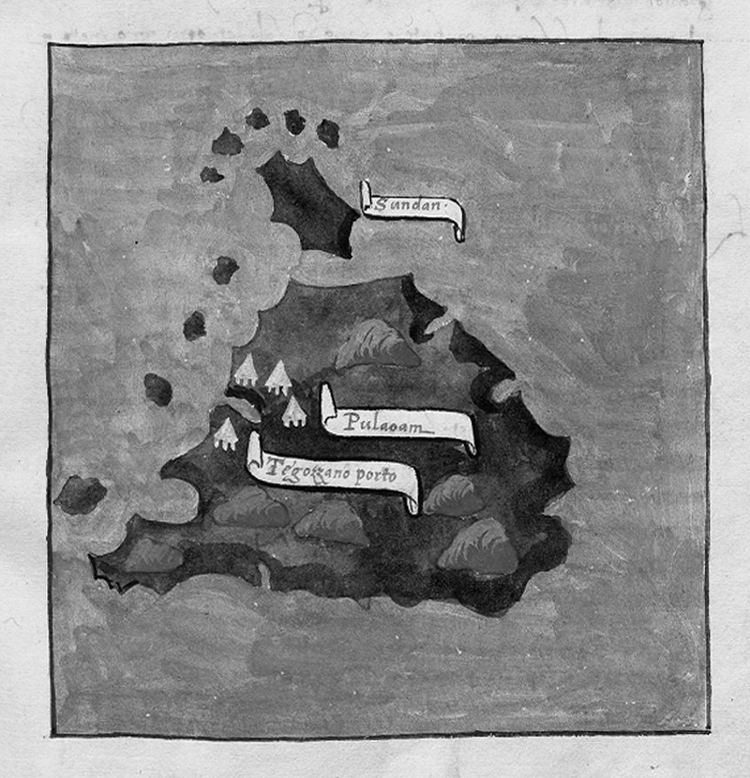|
Giugno 1521
Partendone de ql ala meza partita de ponente et garbin dessemo in vna ysola non molto grande et casi deshabitata La gente de questa sonno mori et eranno banditi duna ysola deta burne vano nudi Como li alti anno za robotane con li carcasseti alato pienni de freze con erba venenata anno pugnialli con li manisi ornati de oro et de pietre preciose lancie rodelle et corazine de corno de bufalo ne chiamauāo corpi sancti Jn questa ysola se trouaua pocha victuuaglia ma arborj grandissimj sta de Latitudine aL polo articho in sette gradi et mezo et longi da chippit Quaranta tre legue et chiamasse caghaian.
Da questa ysola circa de vinti cinque legue fra ponente et maistralle tro uassemo vna Jzola grande doue si troua rizo gengero porci capre gal?e fighi Longui mezo brazo et grossi como lo bracio sonno boni et alguni alti Longui vno palmo et alti mancho molto megliori de tucti li altri Cochi batate canne dolci radice como rapi aL māgiare et rizo cotto soto lo fuocho in canne o in legnio questo dura piu que qello coto in pigniatte Questa tera poteuāo chiamare la terra de þmissione perche Jnanzi la trouassemo patiuamo grā Fame assay volte stessemo in force de habandomare le naui et andare in terra þ non morire de fame. Lo re fece pace cō noi tagliandosse vno pocho cō vno nȓo cortello in mezo deL pecto et sanguinando se tocho la lingua et La fronte in segnio de piu vera pace cosi fece mo ancho nuy Questa ysola sta de Latitudine aL polo articho in noue gradi et vno terso et cento et septanta vno et vno terso de Longitudine de La lignea ripartitiōe pulaoan.
Questi populi de polaoan vano nudi como li alti Quasi tucti Lauaranno li sui campi hanno zarabotanne cō freze de legnio grosse piu duno palmo arponate et algune con spine de pesce con erba venenata at alte cō ponte de cana arponate et venenate anno neL capo ficato vno pocho de legnio molle in cambio de le penne neL fine dele sue zarabotāe liganno vno fero como di Jannetone et Quando anno tracte le freze combateno cō questo precianno aneli cadennete de latone sonaglie cor teli et piu aL filo de ramo þ ligare li sui ami da pescare anno gally grandi molto domestici nō li mangiāo þ vna certa sua venneratiōe alguna volta li fanno combatere luno cō lalto et ogni vno meta þ Lo suo vno tanto et poy de cului ɋ he suo eL vincitore he suo eL premio et anno vino de rizo lambicato piu grande et meglioȓ de qello de palma.
|
|
Leaving there and laying our course west southwest, we cast anchor at an island not very large and almost uninhabited. The people of that island are Moros and were banished from an island called Burne. They go naked as do the others. They have blowpipes and small quivers at their side, full of arrows and a poisonous herb. They have daggers whose hafts are adorned with gold and precious gems, spears, bucklers, and small cuirasses of buffalo horn. They called us holy beings. Little food was to be found in that island, but [there were] immense trees. It lies in a latitude of seven and one-half degrees toward the Arctic Pole, and is forty-three leguas from Chippit. Its name is Caghaian.
About twenty-five leguas to the west northwest from the above island we found a large island, where rice, ginger, swine, goats, fowls, figs one-half braza long and as thick as the arm [i.e., bananas] (they are excellent; and certain others are one palmo and less in length, and are much better than all the others), cocoanuts, camotes [batate], sugarcane, and roots resembling turnips in taste, are found. Rice is cooked there under the fire in bamboos or in wood; and it lasts better than that cooked in earthen pots. We called that land the land of promise, because we suffered great hunger before we found it. We were often on the point of abandoning the ships and going ashore in order that we might not die of hunger. The king made peace with us by gashing himself slightly in the breast with one of our knives, and upon bleeding, touching the tip of his tongue and his forehead in token of the truest peace, and we did the same. That island lies in a latitude of nine and one-third degrees toward the Arctic Pole, and a longitude of one hundred and seventy-one and one-third degrees from the line of demarcation. [It is called] Pulaoan.
Those people of Polaoan go naked as do the others. Almost all of them cultivate their fields. They have blowpipes with thick wooden arrows more than one palmo long, with harpoon points, and others tipped with fishbones, and poisoned with an herb; while others are tipped with points of bamboo like harpoons and are poisoned. At the end of the arrow they attach a little piece of soft wood, instead of feathers. At the end of their blowpipes they fasten a bit of iron like a spear head; and when they have shot all their arrows they fight with that. They place a value on brass rings and chains, bells, knives, and still more on copper wire for binding their fishhooks. They have large and very tame cocks, which they do not eat because of a certain veneration that they have for them. Sometimes they make them fight with one another, and each one puts up a certain amount on his cock, and the prize goes to him whose cock is the victor. They have distilled rice wine which is stronger and better than that made from the palm.
|

Biblioteca ambrosiana di Milano, Ms. L 103 Sup., fol. 40r

Biblioteca ambrosiana di Milano, Ms. L 103 Sup., fol. 41r
|